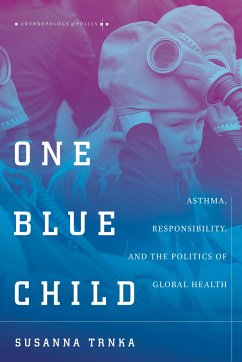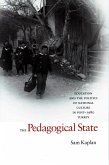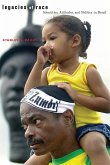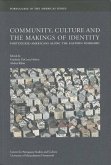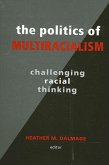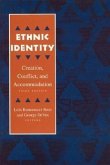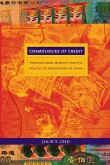- Broschiertes Buch
- Merkliste
- Auf die Merkliste
- Bewerten Bewerten
- Teilen
- Produkt teilen
- Produkterinnerung
- Produkterinnerung
Susanna Trnka is Associate Professor of Social Anthropology at the University of Auckland. She is the author of State of Suffering: Political Violence and Community Survival in Fiji (2008) and the co-editor of Competing Responsibilities: The Politics and Social Ethics of Responsibility in Contemporary Life (2017).
Andere Kunden interessierten sich auch für
![The Pedagogical State The Pedagogical State]() Sam KaplanThe Pedagogical State32,99 €
Sam KaplanThe Pedagogical State32,99 €![Legacies of Race Legacies of Race]() Stanley R BaileyLegacies of Race32,99 €
Stanley R BaileyLegacies of Race32,99 €![Community, Culture and the Makings of Identity: Portuguese-Americans Along the Eastern Seaboard Volume 1 Community, Culture and the Makings of Identity: Portuguese-Americans Along the Eastern Seaboard Volume 1]() Community, Culture and the Makings of Identity: Portuguese-Americans Along the Eastern Seaboard Volume 137,99 €
Community, Culture and the Makings of Identity: Portuguese-Americans Along the Eastern Seaboard Volume 137,99 €![The Politics of Multiracialism The Politics of Multiracialism]() The Politics of Multiracialism41,99 €
The Politics of Multiracialism41,99 €![The Strange Child The Strange Child]() Andrea Gevurtz AraiThe Strange Child37,99 €
Andrea Gevurtz AraiThe Strange Child37,99 €![Ethnic Identity Ethnic Identity]() Lola Romanucci-RossEthnic Identity69,99 €
Lola Romanucci-RossEthnic Identity69,99 €![Cosmologies of Credit Cosmologies of Credit]() Julie Y ChuCosmologies of Credit49,99 €
Julie Y ChuCosmologies of Credit49,99 €-
-
-
Susanna Trnka is Associate Professor of Social Anthropology at the University of Auckland. She is the author of State of Suffering: Political Violence and Community Survival in Fiji (2008) and the co-editor of Competing Responsibilities: The Politics and Social Ethics of Responsibility in Contemporary Life (2017).
Hinweis: Dieser Artikel kann nur an eine deutsche Lieferadresse ausgeliefert werden.
Hinweis: Dieser Artikel kann nur an eine deutsche Lieferadresse ausgeliefert werden.
Produktdetails
- Produktdetails
- Verlag: Stanford University Press
- Seitenzahl: 280
- Erscheinungstermin: 6. Juni 2017
- Englisch
- Abmessung: 229mm x 152mm x 15mm
- Gewicht: 376g
- ISBN-13: 9781503602458
- ISBN-10: 1503602451
- Artikelnr.: 46452526
- Herstellerkennzeichnung
- Produktsicherheitsverantwortliche/r
- Europaallee 1
- 36244 Bad Hersfeld
- gpsr@libri.de
- Verlag: Stanford University Press
- Seitenzahl: 280
- Erscheinungstermin: 6. Juni 2017
- Englisch
- Abmessung: 229mm x 152mm x 15mm
- Gewicht: 376g
- ISBN-13: 9781503602458
- ISBN-10: 1503602451
- Artikelnr.: 46452526
- Herstellerkennzeichnung
- Produktsicherheitsverantwortliche/r
- Europaallee 1
- 36244 Bad Hersfeld
- gpsr@libri.de
Susanna Trnka is Associate Professor of Social Anthropology at the University of Auckland. She is the author of State of Suffering: Political Violence and Community Survival in Fiji (2008) and the co-editor of Competing Responsibilities: The Politics and Social Ethics of Responsibility in Contemporary Life (2017).
Contents and Abstracts
Introduction: Taking Responsibility for Asthma: New Kinds of People, New
Kinds of Health
chapter abstract
This chapter outlines what happens when health reforms designed to
inculcate self-responsibility come up against older forms of relationality,
obligation, and care. Drawing on the concept of "competing
responsibilities," the chapter argues for the need to recognize the
inherent interrelationality of care, outlining how even patients who
embrace the ideals of acting like self-reliant, autonomous subjects are
frequently forced to balance these alongside their obligations to others
and others' efforts on their behalf. Moreover, in some instances, patients
and their caregivers reject self-responsibility in an effort to recast
obligation back onto the state or their physicians, demanding that the sick
be taken care of, instead of being forced to become the facilitators of
their own care. The result is a series of tensions as reformist agendas
open up new opportunities and foreclose others, demanding a reframing of
health and illness beyond the scope of neoliberal agendas.
1Democratizing Knowledge: Patients Caught between Compliance and
Self-Management
chapter abstract
This chapter examines how the adoption of self-managed care in New Zealand
results in new forms of patienthood and medical authority. First, it
outlines how revolutionizing the health-care system to promote policies of
self-management has radically empowered some patients while severely
disadvantaging those already marginalized. It then discusses a tension
central in neoliberal discourses of self-responsibility: Although medical
professionals encourage patients to take responsibility for their own care,
they also feel a professional obligation to use their expertise to steer
patients toward the behaviors they view as efficacious, resulting in
frustration within the clinical encounter. Finally, it demonstrates how, in
the drive to increase patient compliance, many of the same health
professionals who embrace "patient choice" end up blaming patients for
using medication "irresponsibly," thus creating the illusion that
self-management is a foolproof system that fails only when individual
patients lack the discipline to conform.
2Domestic Experiments: When Parents Become "Half a Doctor"
chapter abstract
This chapter examines New Zealand parents' and children's perspectives of
self-management, arguing that being forced to take on the role of the
"patient expert" cuts both ways, overwhelming families unable or unwilling
to manage their own care and granting greater control to families able to
craft their own familial-based health-care routines. Aiming to achieve
"normal childhoods" for their children, many New Zealand parents experiment
with medication, revising dosages and guidelines based on their own
experiential knowledge and, in the words of one mother, becoming "half a
doctor" to cope with their child's condition. Although some of these
parents view asthma as a chronic condition and encourage their children to
adopt ongoing preventative regimes, others are strongly critical of the
pharmaceutical industry and refute chronicity and, in some cases,
reinterpret diagnoses in ways that radically recast "self-management"
beyond what health authorities and policy makers have in mind.
3Patient Agency, Personal Responsibility, and the Upholding of Medical
Expertise
chapter abstract
Twenty-five years after the end of state socialism, the Czech health-care
system is characterized by a constant weighing of market-based approaches
against widespread public support for ensuring solidarity in health-care
provision. This chapter looks at the place of personal responsibility in
both new policies governing health care and associated ideologies of
democratic citizenship. Focusing on clinical encounters and medical
discourses about asthma, the chapter documents the tensions that emerge out
of a health-care system that requires greater patient agency while denying
patients a role in overtly shaping their own care to preserve the power of
the medical elite. It concludes by demonstrating that, despite claims to
the contrary, many Czech patients are agentive in medical encounters, using
the tactics of gift exchange and personal networking to compel physicians
to take responsibility for their care.
4Knowledge, Discipline, and Domesticity: The Work of Raising Healthy
Children
chapter abstract
This chapter is about how Czech women navigate the tricky terrain of
adhering to doctors' directives while crafting their own responsibility and
authority over their children. Most mothers wish to carry out medical
professionals' instructions but are also eager to exercise their own agency
in determining home-based care. Many are also wary of overmedicalizing
their children. Domestic space thus becomes a site where multiple kinds of
knowledge come to a head: the expert knowledge of medical specialists, the
experiential knowledge of mothers dealing with sick children, and
widespread social understandings of medicines as both efficacious and
dangerous. Out of the intimate tangle of interpersonal ties and
obligations, modes of knowledge, and daily practicalities, there emerges a
strikingly different sense of self, care, knowledge, and expertise than
that of the neoliberal, autonomous, self-responsible subject.
5Body, Breath, and Mind: Subjugated Knowledge and Alternative Therapeutics
chapter abstract
This chapter focuses on the phenomenological aspects of breathlessness,
examining the physical and mental aspects of living with asthma as well as
the efforts of some New Zealanders to diminish or cure their asthma through
the use of alternative therapeutic practices, most notably sports and
Buteyko breathing retraining. Once lauded by family physicians as a route
to coping with asthma, sports have largely fallen out of the register of
the biomedical, acting today as an unsystematic "local" or "naïve" form of
knowledge that nonetheless disrupts the hegemonic hold of pharmaceuticals.
Buteyko, in contrast, is best described as a systematic "alternative" mode
of respiratory therapeutics, invented under the auspices of (Russian)
biomedicine and now existing on (Western) biomedicine's fringes. Both
therapeutic approaches address the physical as well as the mental or
emotional aspects of breathlessness and offer distinct counterpoints to the
predominant biomedical focus on pharmaceuticals.
6The Best Holiday Ever: The Pleasures and Pains of Spa Cures and Summer
Camps
chapter abstract
In a March 2014 court decision, the Czech government asserted every Czech
citizen's right to treatment in government-supported sanatorium-style
health spas. Collectively administered and often authoritarian in nature,
the therapeutic regimes enacted in these "total institutions" raise key
questions about the roles of professional responsibility, pleasure, and
discipline in promoting respiratory health. This chapter outlines the
effects of both spa cures and summer asthma camps, documenting how removing
children and their parents from their homes for four to six weeks at a time
can set the stage for a comprehensive mind-body therapeutics, encouraging
relaxation alongside discipline and compelling patients to reframe their
understandings of what their bodies are capable of, despite their asthma.
The disciplined pleasure of spa cures and summer camps, it is argued, is
central to this experience, acting as a catalyst for new behaviors and new
understandings of the body and health.
7Redistributing Responsibility among States, Companies, and Citizens:
Struggles in the Steel Heart of the Republic
chapter abstract
The city of Ostrava is famous for its residents' respiratory problems, with
some scientists contending that it has the world's highest incidence of
childhood asthma. Activists blame Ostrava's steelworks, owned by the
multinational ArcelorMittal, which in turn suggests residents should do
more to personally improve their living conditions. This chapter examines
how respiratory illnesses get cast as a citizenship issue, inspiring
national debate over whether the state, corporations, or individuals are
the ultimate guarantor of citizens' rights. Drawing on prevalent tropes
about working-class labor and vulnerable children, popular representations
of Ostrava's woes portray a struggle between citizens who are suffering and
a state not living up to its obligations. Harkening back to environmental
protests that fueled the 1989 Velvet Revolution, such calls on the state
suggest a "politics of last resort," positioning the state as the ultimate
moral agent and source of responsibility for citizens' health and
well-being.
Conclusion: Problematizing Asthma
chapter abstract
This chapter delineates how health-care policies "problematize" asthma and
the range of "solutions" such problems prompt, highlighting how seemingly
inevitable facets of a phenomenon such as asthma care can, in fact, be
constituted differently across different cultural contexts. The chapter
outlines four key steps for improving asthma outcomes, ranging from
enabling patients to coauthor their self-management programs to addressing
the structural factors that determine respiratory health. It delineates how
using open-ended, ethnographically grounded research enables us to move
beyond the questions that occupy many public health professionals-how to
improve the implementation of self-management-to gain a comprehensive
understanding of the broader social dynamics and power structures that
determine health. It concludes by suggesting how critiquing neoliberal
visions of self-managing subjects necessitates not giving up the ideal of
patient autonomy but recognizing how promoting patient autonomy requires
taking seriously the inherent interrelationality of health.
Introduction: Taking Responsibility for Asthma: New Kinds of People, New
Kinds of Health
chapter abstract
This chapter outlines what happens when health reforms designed to
inculcate self-responsibility come up against older forms of relationality,
obligation, and care. Drawing on the concept of "competing
responsibilities," the chapter argues for the need to recognize the
inherent interrelationality of care, outlining how even patients who
embrace the ideals of acting like self-reliant, autonomous subjects are
frequently forced to balance these alongside their obligations to others
and others' efforts on their behalf. Moreover, in some instances, patients
and their caregivers reject self-responsibility in an effort to recast
obligation back onto the state or their physicians, demanding that the sick
be taken care of, instead of being forced to become the facilitators of
their own care. The result is a series of tensions as reformist agendas
open up new opportunities and foreclose others, demanding a reframing of
health and illness beyond the scope of neoliberal agendas.
1Democratizing Knowledge: Patients Caught between Compliance and
Self-Management
chapter abstract
This chapter examines how the adoption of self-managed care in New Zealand
results in new forms of patienthood and medical authority. First, it
outlines how revolutionizing the health-care system to promote policies of
self-management has radically empowered some patients while severely
disadvantaging those already marginalized. It then discusses a tension
central in neoliberal discourses of self-responsibility: Although medical
professionals encourage patients to take responsibility for their own care,
they also feel a professional obligation to use their expertise to steer
patients toward the behaviors they view as efficacious, resulting in
frustration within the clinical encounter. Finally, it demonstrates how, in
the drive to increase patient compliance, many of the same health
professionals who embrace "patient choice" end up blaming patients for
using medication "irresponsibly," thus creating the illusion that
self-management is a foolproof system that fails only when individual
patients lack the discipline to conform.
2Domestic Experiments: When Parents Become "Half a Doctor"
chapter abstract
This chapter examines New Zealand parents' and children's perspectives of
self-management, arguing that being forced to take on the role of the
"patient expert" cuts both ways, overwhelming families unable or unwilling
to manage their own care and granting greater control to families able to
craft their own familial-based health-care routines. Aiming to achieve
"normal childhoods" for their children, many New Zealand parents experiment
with medication, revising dosages and guidelines based on their own
experiential knowledge and, in the words of one mother, becoming "half a
doctor" to cope with their child's condition. Although some of these
parents view asthma as a chronic condition and encourage their children to
adopt ongoing preventative regimes, others are strongly critical of the
pharmaceutical industry and refute chronicity and, in some cases,
reinterpret diagnoses in ways that radically recast "self-management"
beyond what health authorities and policy makers have in mind.
3Patient Agency, Personal Responsibility, and the Upholding of Medical
Expertise
chapter abstract
Twenty-five years after the end of state socialism, the Czech health-care
system is characterized by a constant weighing of market-based approaches
against widespread public support for ensuring solidarity in health-care
provision. This chapter looks at the place of personal responsibility in
both new policies governing health care and associated ideologies of
democratic citizenship. Focusing on clinical encounters and medical
discourses about asthma, the chapter documents the tensions that emerge out
of a health-care system that requires greater patient agency while denying
patients a role in overtly shaping their own care to preserve the power of
the medical elite. It concludes by demonstrating that, despite claims to
the contrary, many Czech patients are agentive in medical encounters, using
the tactics of gift exchange and personal networking to compel physicians
to take responsibility for their care.
4Knowledge, Discipline, and Domesticity: The Work of Raising Healthy
Children
chapter abstract
This chapter is about how Czech women navigate the tricky terrain of
adhering to doctors' directives while crafting their own responsibility and
authority over their children. Most mothers wish to carry out medical
professionals' instructions but are also eager to exercise their own agency
in determining home-based care. Many are also wary of overmedicalizing
their children. Domestic space thus becomes a site where multiple kinds of
knowledge come to a head: the expert knowledge of medical specialists, the
experiential knowledge of mothers dealing with sick children, and
widespread social understandings of medicines as both efficacious and
dangerous. Out of the intimate tangle of interpersonal ties and
obligations, modes of knowledge, and daily practicalities, there emerges a
strikingly different sense of self, care, knowledge, and expertise than
that of the neoliberal, autonomous, self-responsible subject.
5Body, Breath, and Mind: Subjugated Knowledge and Alternative Therapeutics
chapter abstract
This chapter focuses on the phenomenological aspects of breathlessness,
examining the physical and mental aspects of living with asthma as well as
the efforts of some New Zealanders to diminish or cure their asthma through
the use of alternative therapeutic practices, most notably sports and
Buteyko breathing retraining. Once lauded by family physicians as a route
to coping with asthma, sports have largely fallen out of the register of
the biomedical, acting today as an unsystematic "local" or "naïve" form of
knowledge that nonetheless disrupts the hegemonic hold of pharmaceuticals.
Buteyko, in contrast, is best described as a systematic "alternative" mode
of respiratory therapeutics, invented under the auspices of (Russian)
biomedicine and now existing on (Western) biomedicine's fringes. Both
therapeutic approaches address the physical as well as the mental or
emotional aspects of breathlessness and offer distinct counterpoints to the
predominant biomedical focus on pharmaceuticals.
6The Best Holiday Ever: The Pleasures and Pains of Spa Cures and Summer
Camps
chapter abstract
In a March 2014 court decision, the Czech government asserted every Czech
citizen's right to treatment in government-supported sanatorium-style
health spas. Collectively administered and often authoritarian in nature,
the therapeutic regimes enacted in these "total institutions" raise key
questions about the roles of professional responsibility, pleasure, and
discipline in promoting respiratory health. This chapter outlines the
effects of both spa cures and summer asthma camps, documenting how removing
children and their parents from their homes for four to six weeks at a time
can set the stage for a comprehensive mind-body therapeutics, encouraging
relaxation alongside discipline and compelling patients to reframe their
understandings of what their bodies are capable of, despite their asthma.
The disciplined pleasure of spa cures and summer camps, it is argued, is
central to this experience, acting as a catalyst for new behaviors and new
understandings of the body and health.
7Redistributing Responsibility among States, Companies, and Citizens:
Struggles in the Steel Heart of the Republic
chapter abstract
The city of Ostrava is famous for its residents' respiratory problems, with
some scientists contending that it has the world's highest incidence of
childhood asthma. Activists blame Ostrava's steelworks, owned by the
multinational ArcelorMittal, which in turn suggests residents should do
more to personally improve their living conditions. This chapter examines
how respiratory illnesses get cast as a citizenship issue, inspiring
national debate over whether the state, corporations, or individuals are
the ultimate guarantor of citizens' rights. Drawing on prevalent tropes
about working-class labor and vulnerable children, popular representations
of Ostrava's woes portray a struggle between citizens who are suffering and
a state not living up to its obligations. Harkening back to environmental
protests that fueled the 1989 Velvet Revolution, such calls on the state
suggest a "politics of last resort," positioning the state as the ultimate
moral agent and source of responsibility for citizens' health and
well-being.
Conclusion: Problematizing Asthma
chapter abstract
This chapter delineates how health-care policies "problematize" asthma and
the range of "solutions" such problems prompt, highlighting how seemingly
inevitable facets of a phenomenon such as asthma care can, in fact, be
constituted differently across different cultural contexts. The chapter
outlines four key steps for improving asthma outcomes, ranging from
enabling patients to coauthor their self-management programs to addressing
the structural factors that determine respiratory health. It delineates how
using open-ended, ethnographically grounded research enables us to move
beyond the questions that occupy many public health professionals-how to
improve the implementation of self-management-to gain a comprehensive
understanding of the broader social dynamics and power structures that
determine health. It concludes by suggesting how critiquing neoliberal
visions of self-managing subjects necessitates not giving up the ideal of
patient autonomy but recognizing how promoting patient autonomy requires
taking seriously the inherent interrelationality of health.
Contents and Abstracts
Introduction: Taking Responsibility for Asthma: New Kinds of People, New
Kinds of Health
chapter abstract
This chapter outlines what happens when health reforms designed to
inculcate self-responsibility come up against older forms of relationality,
obligation, and care. Drawing on the concept of "competing
responsibilities," the chapter argues for the need to recognize the
inherent interrelationality of care, outlining how even patients who
embrace the ideals of acting like self-reliant, autonomous subjects are
frequently forced to balance these alongside their obligations to others
and others' efforts on their behalf. Moreover, in some instances, patients
and their caregivers reject self-responsibility in an effort to recast
obligation back onto the state or their physicians, demanding that the sick
be taken care of, instead of being forced to become the facilitators of
their own care. The result is a series of tensions as reformist agendas
open up new opportunities and foreclose others, demanding a reframing of
health and illness beyond the scope of neoliberal agendas.
1Democratizing Knowledge: Patients Caught between Compliance and
Self-Management
chapter abstract
This chapter examines how the adoption of self-managed care in New Zealand
results in new forms of patienthood and medical authority. First, it
outlines how revolutionizing the health-care system to promote policies of
self-management has radically empowered some patients while severely
disadvantaging those already marginalized. It then discusses a tension
central in neoliberal discourses of self-responsibility: Although medical
professionals encourage patients to take responsibility for their own care,
they also feel a professional obligation to use their expertise to steer
patients toward the behaviors they view as efficacious, resulting in
frustration within the clinical encounter. Finally, it demonstrates how, in
the drive to increase patient compliance, many of the same health
professionals who embrace "patient choice" end up blaming patients for
using medication "irresponsibly," thus creating the illusion that
self-management is a foolproof system that fails only when individual
patients lack the discipline to conform.
2Domestic Experiments: When Parents Become "Half a Doctor"
chapter abstract
This chapter examines New Zealand parents' and children's perspectives of
self-management, arguing that being forced to take on the role of the
"patient expert" cuts both ways, overwhelming families unable or unwilling
to manage their own care and granting greater control to families able to
craft their own familial-based health-care routines. Aiming to achieve
"normal childhoods" for their children, many New Zealand parents experiment
with medication, revising dosages and guidelines based on their own
experiential knowledge and, in the words of one mother, becoming "half a
doctor" to cope with their child's condition. Although some of these
parents view asthma as a chronic condition and encourage their children to
adopt ongoing preventative regimes, others are strongly critical of the
pharmaceutical industry and refute chronicity and, in some cases,
reinterpret diagnoses in ways that radically recast "self-management"
beyond what health authorities and policy makers have in mind.
3Patient Agency, Personal Responsibility, and the Upholding of Medical
Expertise
chapter abstract
Twenty-five years after the end of state socialism, the Czech health-care
system is characterized by a constant weighing of market-based approaches
against widespread public support for ensuring solidarity in health-care
provision. This chapter looks at the place of personal responsibility in
both new policies governing health care and associated ideologies of
democratic citizenship. Focusing on clinical encounters and medical
discourses about asthma, the chapter documents the tensions that emerge out
of a health-care system that requires greater patient agency while denying
patients a role in overtly shaping their own care to preserve the power of
the medical elite. It concludes by demonstrating that, despite claims to
the contrary, many Czech patients are agentive in medical encounters, using
the tactics of gift exchange and personal networking to compel physicians
to take responsibility for their care.
4Knowledge, Discipline, and Domesticity: The Work of Raising Healthy
Children
chapter abstract
This chapter is about how Czech women navigate the tricky terrain of
adhering to doctors' directives while crafting their own responsibility and
authority over their children. Most mothers wish to carry out medical
professionals' instructions but are also eager to exercise their own agency
in determining home-based care. Many are also wary of overmedicalizing
their children. Domestic space thus becomes a site where multiple kinds of
knowledge come to a head: the expert knowledge of medical specialists, the
experiential knowledge of mothers dealing with sick children, and
widespread social understandings of medicines as both efficacious and
dangerous. Out of the intimate tangle of interpersonal ties and
obligations, modes of knowledge, and daily practicalities, there emerges a
strikingly different sense of self, care, knowledge, and expertise than
that of the neoliberal, autonomous, self-responsible subject.
5Body, Breath, and Mind: Subjugated Knowledge and Alternative Therapeutics
chapter abstract
This chapter focuses on the phenomenological aspects of breathlessness,
examining the physical and mental aspects of living with asthma as well as
the efforts of some New Zealanders to diminish or cure their asthma through
the use of alternative therapeutic practices, most notably sports and
Buteyko breathing retraining. Once lauded by family physicians as a route
to coping with asthma, sports have largely fallen out of the register of
the biomedical, acting today as an unsystematic "local" or "naïve" form of
knowledge that nonetheless disrupts the hegemonic hold of pharmaceuticals.
Buteyko, in contrast, is best described as a systematic "alternative" mode
of respiratory therapeutics, invented under the auspices of (Russian)
biomedicine and now existing on (Western) biomedicine's fringes. Both
therapeutic approaches address the physical as well as the mental or
emotional aspects of breathlessness and offer distinct counterpoints to the
predominant biomedical focus on pharmaceuticals.
6The Best Holiday Ever: The Pleasures and Pains of Spa Cures and Summer
Camps
chapter abstract
In a March 2014 court decision, the Czech government asserted every Czech
citizen's right to treatment in government-supported sanatorium-style
health spas. Collectively administered and often authoritarian in nature,
the therapeutic regimes enacted in these "total institutions" raise key
questions about the roles of professional responsibility, pleasure, and
discipline in promoting respiratory health. This chapter outlines the
effects of both spa cures and summer asthma camps, documenting how removing
children and their parents from their homes for four to six weeks at a time
can set the stage for a comprehensive mind-body therapeutics, encouraging
relaxation alongside discipline and compelling patients to reframe their
understandings of what their bodies are capable of, despite their asthma.
The disciplined pleasure of spa cures and summer camps, it is argued, is
central to this experience, acting as a catalyst for new behaviors and new
understandings of the body and health.
7Redistributing Responsibility among States, Companies, and Citizens:
Struggles in the Steel Heart of the Republic
chapter abstract
The city of Ostrava is famous for its residents' respiratory problems, with
some scientists contending that it has the world's highest incidence of
childhood asthma. Activists blame Ostrava's steelworks, owned by the
multinational ArcelorMittal, which in turn suggests residents should do
more to personally improve their living conditions. This chapter examines
how respiratory illnesses get cast as a citizenship issue, inspiring
national debate over whether the state, corporations, or individuals are
the ultimate guarantor of citizens' rights. Drawing on prevalent tropes
about working-class labor and vulnerable children, popular representations
of Ostrava's woes portray a struggle between citizens who are suffering and
a state not living up to its obligations. Harkening back to environmental
protests that fueled the 1989 Velvet Revolution, such calls on the state
suggest a "politics of last resort," positioning the state as the ultimate
moral agent and source of responsibility for citizens' health and
well-being.
Conclusion: Problematizing Asthma
chapter abstract
This chapter delineates how health-care policies "problematize" asthma and
the range of "solutions" such problems prompt, highlighting how seemingly
inevitable facets of a phenomenon such as asthma care can, in fact, be
constituted differently across different cultural contexts. The chapter
outlines four key steps for improving asthma outcomes, ranging from
enabling patients to coauthor their self-management programs to addressing
the structural factors that determine respiratory health. It delineates how
using open-ended, ethnographically grounded research enables us to move
beyond the questions that occupy many public health professionals-how to
improve the implementation of self-management-to gain a comprehensive
understanding of the broader social dynamics and power structures that
determine health. It concludes by suggesting how critiquing neoliberal
visions of self-managing subjects necessitates not giving up the ideal of
patient autonomy but recognizing how promoting patient autonomy requires
taking seriously the inherent interrelationality of health.
Introduction: Taking Responsibility for Asthma: New Kinds of People, New
Kinds of Health
chapter abstract
This chapter outlines what happens when health reforms designed to
inculcate self-responsibility come up against older forms of relationality,
obligation, and care. Drawing on the concept of "competing
responsibilities," the chapter argues for the need to recognize the
inherent interrelationality of care, outlining how even patients who
embrace the ideals of acting like self-reliant, autonomous subjects are
frequently forced to balance these alongside their obligations to others
and others' efforts on their behalf. Moreover, in some instances, patients
and their caregivers reject self-responsibility in an effort to recast
obligation back onto the state or their physicians, demanding that the sick
be taken care of, instead of being forced to become the facilitators of
their own care. The result is a series of tensions as reformist agendas
open up new opportunities and foreclose others, demanding a reframing of
health and illness beyond the scope of neoliberal agendas.
1Democratizing Knowledge: Patients Caught between Compliance and
Self-Management
chapter abstract
This chapter examines how the adoption of self-managed care in New Zealand
results in new forms of patienthood and medical authority. First, it
outlines how revolutionizing the health-care system to promote policies of
self-management has radically empowered some patients while severely
disadvantaging those already marginalized. It then discusses a tension
central in neoliberal discourses of self-responsibility: Although medical
professionals encourage patients to take responsibility for their own care,
they also feel a professional obligation to use their expertise to steer
patients toward the behaviors they view as efficacious, resulting in
frustration within the clinical encounter. Finally, it demonstrates how, in
the drive to increase patient compliance, many of the same health
professionals who embrace "patient choice" end up blaming patients for
using medication "irresponsibly," thus creating the illusion that
self-management is a foolproof system that fails only when individual
patients lack the discipline to conform.
2Domestic Experiments: When Parents Become "Half a Doctor"
chapter abstract
This chapter examines New Zealand parents' and children's perspectives of
self-management, arguing that being forced to take on the role of the
"patient expert" cuts both ways, overwhelming families unable or unwilling
to manage their own care and granting greater control to families able to
craft their own familial-based health-care routines. Aiming to achieve
"normal childhoods" for their children, many New Zealand parents experiment
with medication, revising dosages and guidelines based on their own
experiential knowledge and, in the words of one mother, becoming "half a
doctor" to cope with their child's condition. Although some of these
parents view asthma as a chronic condition and encourage their children to
adopt ongoing preventative regimes, others are strongly critical of the
pharmaceutical industry and refute chronicity and, in some cases,
reinterpret diagnoses in ways that radically recast "self-management"
beyond what health authorities and policy makers have in mind.
3Patient Agency, Personal Responsibility, and the Upholding of Medical
Expertise
chapter abstract
Twenty-five years after the end of state socialism, the Czech health-care
system is characterized by a constant weighing of market-based approaches
against widespread public support for ensuring solidarity in health-care
provision. This chapter looks at the place of personal responsibility in
both new policies governing health care and associated ideologies of
democratic citizenship. Focusing on clinical encounters and medical
discourses about asthma, the chapter documents the tensions that emerge out
of a health-care system that requires greater patient agency while denying
patients a role in overtly shaping their own care to preserve the power of
the medical elite. It concludes by demonstrating that, despite claims to
the contrary, many Czech patients are agentive in medical encounters, using
the tactics of gift exchange and personal networking to compel physicians
to take responsibility for their care.
4Knowledge, Discipline, and Domesticity: The Work of Raising Healthy
Children
chapter abstract
This chapter is about how Czech women navigate the tricky terrain of
adhering to doctors' directives while crafting their own responsibility and
authority over their children. Most mothers wish to carry out medical
professionals' instructions but are also eager to exercise their own agency
in determining home-based care. Many are also wary of overmedicalizing
their children. Domestic space thus becomes a site where multiple kinds of
knowledge come to a head: the expert knowledge of medical specialists, the
experiential knowledge of mothers dealing with sick children, and
widespread social understandings of medicines as both efficacious and
dangerous. Out of the intimate tangle of interpersonal ties and
obligations, modes of knowledge, and daily practicalities, there emerges a
strikingly different sense of self, care, knowledge, and expertise than
that of the neoliberal, autonomous, self-responsible subject.
5Body, Breath, and Mind: Subjugated Knowledge and Alternative Therapeutics
chapter abstract
This chapter focuses on the phenomenological aspects of breathlessness,
examining the physical and mental aspects of living with asthma as well as
the efforts of some New Zealanders to diminish or cure their asthma through
the use of alternative therapeutic practices, most notably sports and
Buteyko breathing retraining. Once lauded by family physicians as a route
to coping with asthma, sports have largely fallen out of the register of
the biomedical, acting today as an unsystematic "local" or "naïve" form of
knowledge that nonetheless disrupts the hegemonic hold of pharmaceuticals.
Buteyko, in contrast, is best described as a systematic "alternative" mode
of respiratory therapeutics, invented under the auspices of (Russian)
biomedicine and now existing on (Western) biomedicine's fringes. Both
therapeutic approaches address the physical as well as the mental or
emotional aspects of breathlessness and offer distinct counterpoints to the
predominant biomedical focus on pharmaceuticals.
6The Best Holiday Ever: The Pleasures and Pains of Spa Cures and Summer
Camps
chapter abstract
In a March 2014 court decision, the Czech government asserted every Czech
citizen's right to treatment in government-supported sanatorium-style
health spas. Collectively administered and often authoritarian in nature,
the therapeutic regimes enacted in these "total institutions" raise key
questions about the roles of professional responsibility, pleasure, and
discipline in promoting respiratory health. This chapter outlines the
effects of both spa cures and summer asthma camps, documenting how removing
children and their parents from their homes for four to six weeks at a time
can set the stage for a comprehensive mind-body therapeutics, encouraging
relaxation alongside discipline and compelling patients to reframe their
understandings of what their bodies are capable of, despite their asthma.
The disciplined pleasure of spa cures and summer camps, it is argued, is
central to this experience, acting as a catalyst for new behaviors and new
understandings of the body and health.
7Redistributing Responsibility among States, Companies, and Citizens:
Struggles in the Steel Heart of the Republic
chapter abstract
The city of Ostrava is famous for its residents' respiratory problems, with
some scientists contending that it has the world's highest incidence of
childhood asthma. Activists blame Ostrava's steelworks, owned by the
multinational ArcelorMittal, which in turn suggests residents should do
more to personally improve their living conditions. This chapter examines
how respiratory illnesses get cast as a citizenship issue, inspiring
national debate over whether the state, corporations, or individuals are
the ultimate guarantor of citizens' rights. Drawing on prevalent tropes
about working-class labor and vulnerable children, popular representations
of Ostrava's woes portray a struggle between citizens who are suffering and
a state not living up to its obligations. Harkening back to environmental
protests that fueled the 1989 Velvet Revolution, such calls on the state
suggest a "politics of last resort," positioning the state as the ultimate
moral agent and source of responsibility for citizens' health and
well-being.
Conclusion: Problematizing Asthma
chapter abstract
This chapter delineates how health-care policies "problematize" asthma and
the range of "solutions" such problems prompt, highlighting how seemingly
inevitable facets of a phenomenon such as asthma care can, in fact, be
constituted differently across different cultural contexts. The chapter
outlines four key steps for improving asthma outcomes, ranging from
enabling patients to coauthor their self-management programs to addressing
the structural factors that determine respiratory health. It delineates how
using open-ended, ethnographically grounded research enables us to move
beyond the questions that occupy many public health professionals-how to
improve the implementation of self-management-to gain a comprehensive
understanding of the broader social dynamics and power structures that
determine health. It concludes by suggesting how critiquing neoliberal
visions of self-managing subjects necessitates not giving up the ideal of
patient autonomy but recognizing how promoting patient autonomy requires
taking seriously the inherent interrelationality of health.

